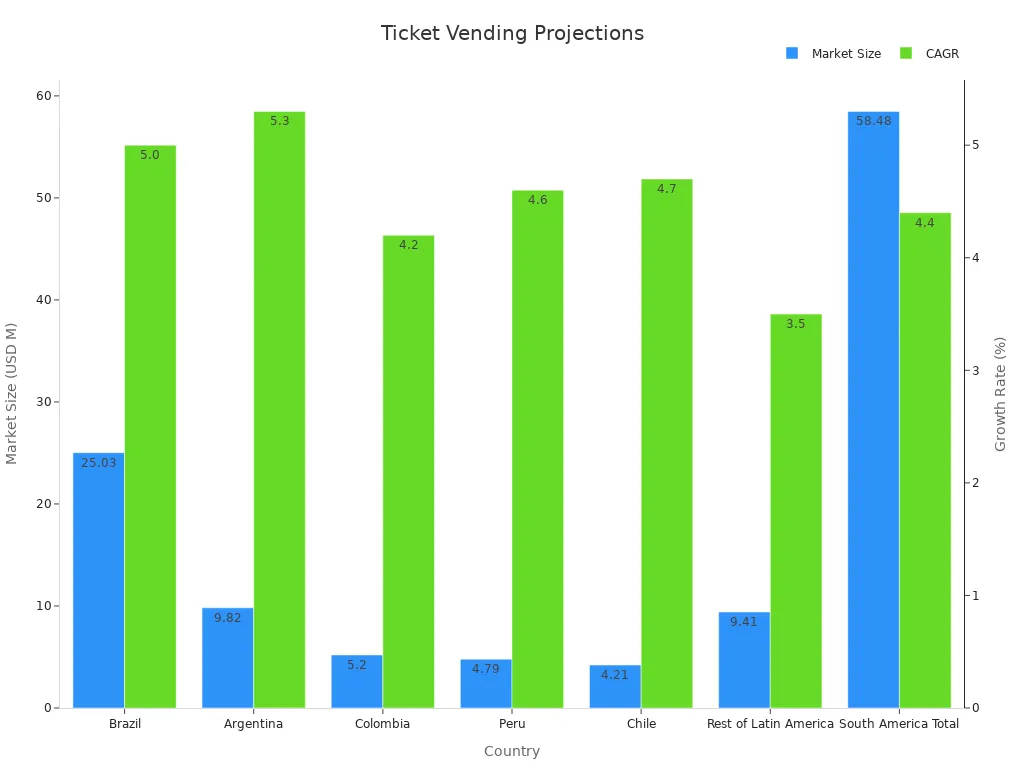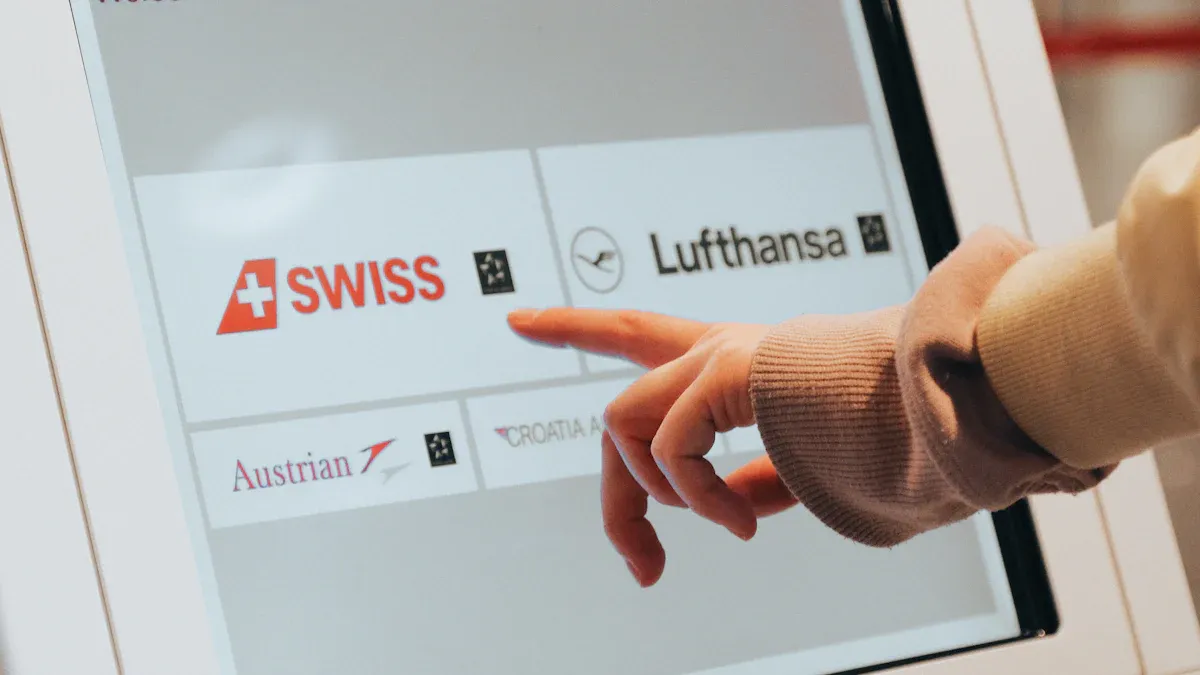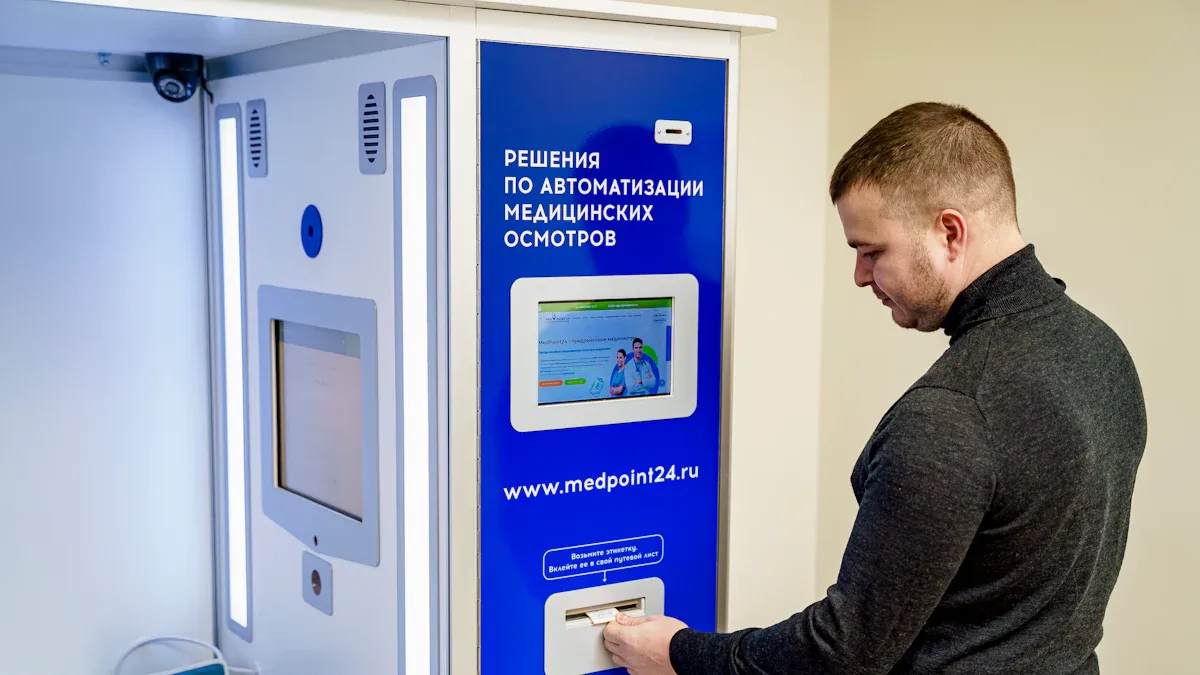
You face a rapidly evolving landscape when choosing a ticket vending machine for your business in 2025. The global market for ticket vending machines continues to expand, projected to reach nearly USD 5.7 billion by 2032 as automation and smart technology drive demand. Urbanization and the rise of digital payment solutions push vending machines into new sectors, including Esl Retail and entertainment.

Convenience remains essential, with businesses seeking ticket vending machines that support payment innovations like ESL Price Tag and ESL Gateway AP integration. Electronic Shelf Labels and robust ticket security features help streamline operations and protect your business.

Defining Business Requirements for Ticket Vending Machines
Assessing Business Volume and Usage Needs
Daily and Peak Transaction Volumes for Ticket Vending Machines
You need to evaluate how many ticket transactions your vending machines will handle each day. Start by estimating both average and peak periods. High-traffic times, such as weekends or special events, can create spikes in ticket purchases. If you underestimate these volumes, you risk long wait times and frustrated customers.
Tip: Track the number of tickets sold per period and monitor the average handle time for each transaction. These operational KPIs help you measure efficiency and identify bottlenecks in your ticket vending machine setup.
Planning for Business Growth and Scalability
Your vending business should plan for future expansion. Choose ticket vending machines that can scale with your needs. Look for models that support software upgrades and additional hardware modules. This flexibility ensures you can increase ticket availability and add new ticket options as your business grows.
- Consider these factors for scalability:
- Can you add more machines at new locations easily?
- Does the system allow for remote updates and integration with new payment methods?
- Will the machines handle increased ticket selection as your offerings expand?
Types of Tickets and Payment Methods in Vending Machines
Physical vs. Digital Ticket Options for Your Business
You must decide whether to offer physical tickets, digital tickets, or both. Physical tickets remain popular in transit and event settings, while digital ticket options appeal to tech-savvy customers who prefer using their smartphones. Offering both options increases ticket availability and meets diverse customer preferences.
- Physical tickets: Useful for customers who want a tangible proof of purchase.
- Digital tickets: Enable cashless transactions and reduce paper waste.
Supporting Cash, Card, and Contactless Payments
Modern vending machines must support multiple payment options. Customers expect to pay with cash, credit or debit cards, and contactless methods such as NFC or QR codes. Cashless solutions, including digital wallets, are now standard in high-traffic environments.
Supporting multiple payment options improves efficiency and customer satisfaction. It also reduces the risk of lost sales due to limited payment acceptance.
Ideal Vending Machine Locations and Space Considerations
Indoor vs. Outdoor Ticket Vending Machine Placement
Selecting ideal vending machine locations is critical for maximizing performance. Indoor locations, such as lobbies or transit stations, protect machines from weather and vandalism. Outdoor placements require robust enclosures and weatherproofing. You must match the machine’s features to the demands of each environment.
Accessible placement in high-traffic areas increases user engagement. Machines should be easy to spot and positioned where people naturally pass by. Avoid hidden corners or areas with poor visibility.
Space Availability and Accessibility for Business Operations
Evaluate the available space at your chosen locations. Ensure there is enough room for users to approach, interact, and complete ticket purchases comfortably. Accessibility remains essential, especially for customers with disabilities. Poor accessibility leads to lower usability scores and decreased efficiency, particularly in busy environments.
- Checklist for space and accessibility:
- Is the machine reachable for wheelchair users?
- Does the interface provide clear instructions and feedback?
- Can users easily access the machine without crowding?
Remember, fragmented interfaces and unclear feedback mechanisms can frustrate users and reduce trust in your ticket vending machines.
Key Features to Look For in Ticket Vending Machines

User Interface and Accessibility for Business Customers
Touchscreen Quality and Display Readability
You want your customers to interact with a user-friendly interface that feels intuitive from the first touch. High-quality touchscreens with responsive controls improve the user experience and reduce transaction times. Bright, anti-glare displays ensure that users can read instructions and ticket options clearly, even in direct sunlight or under harsh indoor lighting. When you invest in clear display readability, you help every customer complete their ticket purchase with confidence.
A crisp display and responsive touchscreen can transform a routine ticket vending machine interaction into a seamless experience, especially during peak hours.
Multilingual Support and ADA Compliance in Vending Machines
Your business serves a diverse customer base. Multilingual support in ticket vending machines allows you to offer instructions and ticket options in several languages, making the process accessible to more people. ADA compliance ensures that your machines meet legal requirements for accessibility and provide equal service to all users. Accessibility features such as tactile buttons, audio prompts, and adjustable screen heights help customers with disabilities complete their ticket transactions independently.
- Multilingual menus and ADA-compliant controls expand your reach and demonstrate your commitment to inclusivity.
- You improve convenience for international travelers and local customers alike.
Security and Fraud Prevention in Ticket Vending Machines
Payment Data Encryption and Protection
You must protect your customers’ sensitive payment information. Modern ticket vending machines use advanced encryption protocols to secure every cashless transaction. End-to-end encryption shields cardholder data from interception during the payment process. This security measure builds trust and encourages more users to choose cashless options for ticket purchases.
Secure payment processing is not just a feature—it is a necessity for any business that values customer trust and regulatory compliance.
Anti-Tampering Features and Physical Security
Physical security remains a top priority for any ticket vending machine. Anti-tampering mechanisms, such as reinforced locks and alarm systems, deter theft and vandalism. You should look for machines with robust enclosures and sensors that detect unauthorized access attempts. These features protect both your revenue and your customers’ safety.
- Regularly inspect your machines for signs of tampering.
- Choose models with built-in alerts that notify you of suspicious activity.
Integration with Existing Business Systems
POS and Back-Office System Compatibility
Seamless integration with your existing POS and back-office systems streamlines your operations. Ticket vending machines that connect directly to your business software allow you to track sales, manage inventory, and analyze performance in real time. This compatibility reduces manual data entry and minimizes errors, saving you time and money.
API and Software Integration for Ticket Vending Machines
API integration unlocks powerful benefits for your business. You can connect your ticket vending machines to a wide range of devices and platforms, including ERP systems, bill and coin acceptors, and entertainment equipment. This flexibility supports dynamic pricing, remote monitoring, and instant alerts. According to recent industry data, API integration can reduce service and maintenance costs by up to 90% and increase profitability by 12% through downtime optimization and real-time price adjustments.
| Metric / Feature | Value / Description |
|---|---|
| Cost reduction on service and maintenance | 90% reduction |
| Profitability increase | 12% increase through dynamic pricing and downtime optimization |
| ERP system integration | API integration enables implementation in any ERP system, expanding functionality |
| Compatibility with bill and coin acceptors | Supports devices from multiple manufacturers (e.g., Crane Payment Innovations, ICT, NRI) |
| Supported protocols | MDB, EXE, Pulse, RS-232 |
| Real-time telemetry benefits | Enables remote monitoring, instant alerts, sales analysis, remote configuration, and price adjustments |
You gain the ability to manage ticket dispensing, monitor sales, and adjust ticket options remotely. This level of control supports your digital transformation goals and positions your business for future growth.
With 74% of organizations prioritizing digital transformation, integrating your ticket vending machines with modern APIs ensures you stay ahead of industry trends and maximize convenience for your customers.
Evaluating Technology and Future-Proofing Your Ticket Vending Machine

Software Upgradability for Business Flexibility
Remote Updates and Security Patches for Vending Machines
You need to keep your vending machines secure and up to date. Remote updates allow you to install security patches and new features without sending a technician on-site. This approach saves you time and reduces operational disruptions. When you choose a ticket vending machine that supports remote updates, you improve time efficiency and protect your business from emerging threats. Regular updates also help you comply with industry standards and maintain customer trust.
Customizable Software Features for Ticket Vending Machines
Customizable software features let you adapt your ticket vending machines to changing business needs. You can add new ticket types, adjust pricing, or introduce seasonal promotions. This flexibility ensures your machines stay relevant as your business evolves. You also gain the ability to tailor the user interface, making the ticket purchase process simple and engaging for every customer.
Mobile and Contactless Payment Support in Ticket Vending Machines
NFC and QR Code Capabilities for Business Transactions
Modern customers expect fast, secure, and convenient payment options. NFC and QR code technologies have transformed the ticket vending machine market. Over 60% of global installations now support these cashless methods. In North America, more than 70% of vending machines accept non-cash payments, while Japan leads with nearly 80% adoption. Companies like Parkeon have introduced fully integrated systems that support mobile wallets, NFC cards, and QR codes. This shift reflects a strong preference for digital and contactless payment solutions.
| Region/Aspect | Adoption Rate (%) | Notes |
|---|---|---|
| Global non-cash transactions | ~60 | Dominance of digital/contactless methods |
| New TVMs with NFC & QR | >75 | Strong integration in new machines |
| North America | >70 | High regional adoption |
| Europe | 65-70 | Major cities integrating NFC and QR code payments |
| Japan | ~80 | Leading in mobile and card-based cashless payments |
Digital Wallet Integration for Modern Payment Methods
You should select ticket vending machines that support digital wallet integration. This feature allows customers to pay using their smartphones or wearable devices. Cashless transactions increase efficiency and reduce the risk of handling errors. By offering digital wallet support, you meet the expectations of tech-savvy users and streamline the ticket purchase process.
Remote Monitoring and Analytics for Business Optimization
Real-Time Performance Tracking of Ticket Vending Machines
Remote monitoring gives you instant access to the status and performance of your vending machines. You can track sales, machine health, and ticket inventory in real time. This capability enables you to respond quickly to issues, reducing downtime and improving efficiency. Real-time analytics also help you identify trends and optimize your operations.
- Real-time monitoring enables timely interventions.
- You can manage accounting data instantly.
- Customizing the machine interface based on location or season improves the user experience.
- Dynamic messages and multimedia content enhance customer interaction.
Automated Alerts and Reporting for Business Insights
Automated alerts notify you of potential problems before they impact your business. Analytics dashboards and cloud-based reports support audits and help you maintain operational accountability. Preventive maintenance scheduling, powered by real-time data, reduces repair costs and keeps your ticket vending machines running smoothly. Mobile-enabled issue reporting speeds up work order resolution, while standardized processes improve maintenance quality.
Proactive monitoring and analytics minimize equipment downtime and boost operational efficiency. You gain valuable insights that help you make informed decisions and deliver a better ticket purchasing experience.
Cost Considerations and ROI for Ticket Vending Machines
Upfront vs. Ongoing Costs for Your Business
Purchase Price vs. Leasing Options for Ticket Vending Machines
When you evaluate ticket vending machines, you face a choice between purchasing and leasing. The purchase price for a modern machine ranges from $3,000 to $15,000, depending on features and technology. Leasing offers a lower initial barrier, spreading payments over time. This option helps you manage cash flow, especially if you operate a small business or plan to scale gradually. However, leasing may result in higher total expenses over the machine’s lifespan.
You must weigh the benefits of owning equipment outright against the flexibility of leasing. High upfront costs can limit your ability to invest in other areas, but ownership often leads to long-term cost-reduction and higher revenue retention.
Transaction and Processing Fees in Vending Machines
Ongoing expenses extend beyond the initial investment. Payment processing fees, monthly service charges, and software licensing all impact your bottom line. Each transaction may incur a fee, especially when customers use credit cards or digital wallets. These fees can add up quickly, reducing your net revenue. You should also consider costs for permits, insurance, and inventory stocking. Careful analysis of these recurring expenses helps you forecast profitability and set realistic ROI expectations.
Tip: Review your payment processing agreements regularly to ensure you receive competitive rates and avoid unnecessary charges.
Maintenance and Support Services for Ticket Vending Machines
Scheduled Maintenance Plans for Business Continuity
Regular maintenance keeps your vending machines running smoothly. Scheduled maintenance plans can prevent up to 90% of breakdowns, minimizing downtime and protecting your revenue stream. By investing in preventive care, you avoid costly repairs and lost sales due to machine malfunctions. A proactive approach ensures your machines remain reliable, especially during peak usage periods.
Technical Support Availability for Vending Machines
Access to technical support is vital for business continuity. When issues arise, prompt assistance reduces downtime and restores service quickly. You should choose vendors that offer 24/7 support and remote diagnostics. Fast response times help you maintain customer satisfaction and steady revenue flow.
Warranty and Service Agreements for Business Protection
Coverage Terms and Duration for Ticket Vending Machines
Warranty coverage protects your investment in ticket vending machines. Review the terms carefully, including duration and what components are covered. Comprehensive warranties reduce unexpected repair costs and provide peace of mind. Longer coverage periods often signal higher product quality and vendor confidence.
Service Level Agreements (SLAs) for Business Assurance
Service Level Agreements (SLAs) define the standards you can expect from your vendor. SLAs specify response times, repair commitments, and uptime guarantees. Clear agreements ensure accountability and help you maintain consistent revenue by minimizing service interruptions.
Note: Strong warranty and SLA terms support your business goals and safeguard your revenue against unforeseen disruptions.
Vendor Selection and After-Sales Support for Ticket Vending Machines
Evaluating Vendor Reputation and Reviews in the Vending Machines Industry
Industry Experience and Track Record with Ticket Vending Machines
You should always check a vendor’s experience before making a decision. Vendors with a long history in the vending machines industry often deliver more reliable products and services. Look for companies that have supplied ticket vending machines to businesses similar to yours. A strong track record shows that the vendor understands your operational needs and can help you avoid common pitfalls.
Tip: Ask vendors about their most recent projects and the types of clients they serve. This information helps you gauge their expertise and suitability for your vending business.
Customer Testimonials and Case Studies for Business Confidence
You gain valuable insights by reviewing customer testimonials and case studies. These resources highlight how vendors solve real-world challenges and support business growth. Focus on examples that show improvements in efficiency, uptime, and revenue. Reliable vendors will provide references or case studies upon request.
Customization Options for Ticket Vending Machines
Branding and Interface Personalization for Your Business
You want your ticket vending machines to reflect your brand identity. Custom branding options, such as logos, color schemes, and interface layouts, help you create a consistent customer experience. Personalized interfaces also make it easier for users to navigate the machine, which can increase satisfaction and repeat usage.
- Custom branding builds trust with your customers.
- A familiar interface reduces confusion and speeds up transactions.
Hardware and Software Modifications in Vending Machines
You may need specific hardware or software features to support your business goals. Leading vendors offer modular designs that let you add or upgrade components as your needs change. For example, you can request additional payment modules or advanced reporting tools. Flexible software lets you adjust ticket types, pricing, and promotional offers to maximize revenue.
Training and Customer Support for Business Success
Onboarding and Staff Training for Ticket Vending Machines
Proper onboarding ensures your team can operate and maintain the machines efficiently. Vendors should provide clear training materials and hands-on demonstrations. Well-trained staff can troubleshoot minor issues, reducing downtime and protecting your revenue stream.
Ongoing Customer Assistance and Support Services
You need reliable support after installation. Choose vendors that offer responsive customer service, including remote diagnostics and quick repair services. Ongoing assistance helps you resolve problems fast and keeps your vending machines running smoothly. Strong after-sales support protects your business from unexpected disruptions and helps you maintain steady revenue.
Note: Consistent support and training from your vendor can make a significant difference in your long-term success.
Selecting the right ticket vending machine shapes your business success. Match machine features to your unique needs and choose locations that drive performance. Evaluate technology for future compatibility, seamless integration, and strong security. Understand the total cost of ownership before you commit. Choose a vendor with proven after-sales support.
Final Checklist for Your Ticket Vending Machine Purchase:
- ✅ Align features with business goals
- ✅ Confirm payment and ticket options
- ✅ Assess integration and scalability
- ✅ Review costs and support agreements
- ✅ Select optimal machine locations
FAQ
What payment methods should you prioritize in a ticket vending machine?
You should prioritize machines that accept cash, credit cards, contactless payments, and digital wallets. This flexibility ensures you meet customer expectations and maximize sales opportunities.
How often should you schedule maintenance for your ticket vending machines?
You should schedule preventive maintenance at least once every quarter. Regular checks help you avoid unexpected breakdowns and keep your machines running smoothly.
Can you integrate ticket vending machines with your existing POS system?
Yes, most modern ticket vending machines support integration with POS systems. You should confirm compatibility with your vendor before purchase.
What security features do you need in a ticket vending machine?
You need encryption for payment data, anti-tampering mechanisms, and secure enclosures. These features protect your business and your customers from fraud and theft.
How do you choose the best location for a ticket vending machine?
You should place machines in high-traffic, visible areas. Consider accessibility for all users and ensure the location supports your business goals.
Is it better to lease or buy a ticket vending machine?
Leasing offers lower upfront costs and flexibility. Buying provides long-term savings and asset ownership. You should evaluate your budget and business plan before deciding.
What support should you expect from your ticket vending machine vendor?
You should expect onboarding, staff training, 24/7 technical support, and access to software updates. Reliable support ensures your machines operate efficiently.
How can you future-proof your ticket vending machine investment?
You should select machines with remote update capabilities, modular hardware, and support for new payment technologies. This approach keeps your machines relevant as technology evolves.


